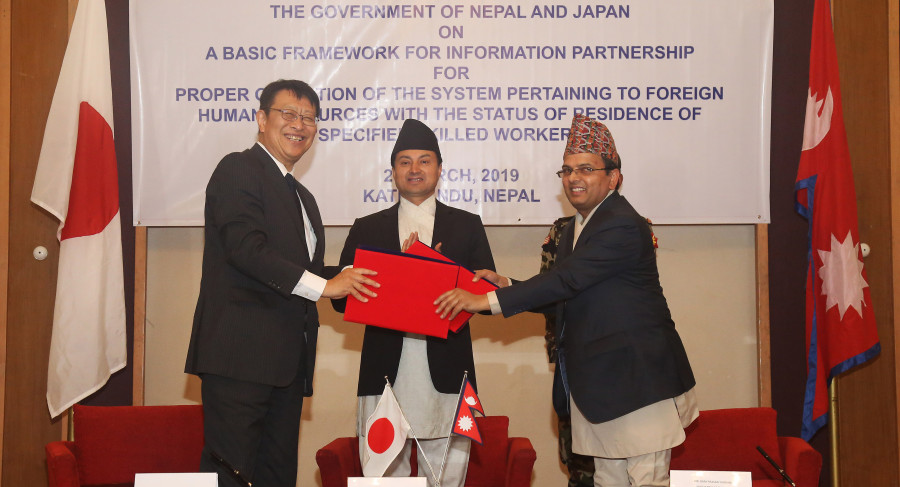National
Japan opens its door for Nepali skilled workers
Nepal and Japan signed an agreement on Monday, formally paving the way for migration of Nepali workers to Japan, one of the most lucrative labour destinations for Nepali workers, under the government-to-government modality.
Chandan Kumar Mandal
Nepal and Japan signed an agreement on Monday, formally paving the way for migration of Nepali workers to Japan, one of the most lucrative labour destinations for Nepali workers, under the government-to-government modality.
Signing of the agreement between the two countries has finally put an end to the claims that recruiting agencies would be involved in hiring of Nepali workers for Japan. The government-to-government modality means there will be no presence of intermediary agents and agencies for jobs in Japan.
The agreement termed “Memorandum of Cooperation (MoC) on sending Nepali workers with the status of residence of Specified Skilled Workers (SSW) to Japan” was signed by Ram Prasad Ghimire, officiating secretary at the Ministry of Labour, Employment and Social Security and Japanese Ambassador to Nepal Masamichi Saigo.
Minister for Labour, Employment and Social Security Gokarna Bista said the agreement now would make the dreams of Nepali youths reaching Japan and working there come true.
“Besides taking Nepal and Japan relations to new heights, this understanding will make dreams of Nepali youths working in Japan come true,” Bista told. “Equality of treatment between Nepali workers and their Japanese counterparts with similar rights and facilities is one of the encouraging aspects of the understanding.”
In the wake of acute labour shortage due to its aging demography, the Japanese lower House in December last year through a special bill, which sought to make major changes to its immigration law, had decided to accept foreign workers from nine labour source countries including Nepal.
The revised Immigration Control Act, which comes into effect in April 2019, will also mark the beginning of influx of foreign workers into Japan. Tokyo expects to hire an estimated 345,150 foreign workers from nine countries in 14 sectors over five years. These sectors include nursing care; building cleaning; agriculture; fishing industry; food and drink manufacturing (including seafood processing); restaurant (food and drink service); materials industry, industrial machinery industry; electronics and electrical equipment industry; construction; shipbuilding/marine industry; car maintenance; aviation (Airport ground handling, aircraft maintenance); and lodging/hospitality.
Nepal is the only South Asian country on the list of countries from where Japan would be hiring workers. Japan has already signed a similar MoC with the Philippines, for accepting workers from the Southeast Asian country.
“The longstanding relations between the two countries, and good reputation Nepali citizens have earned for themselves in Japan were the factors for selecting Nepali workers,” said Ambassador Masamichi Saigo, after signing of the agreement.
However, the opportunity to work in one of the highly developed nations of Asia would not be available for all Nepali migrant workers.
Only workers having been trained in one of the 14 sectors and having working knowledge of Japanese language would be eligible for jobs in Japan. The aspirant candidates will be expected to have a Japanese language level equivalent to “N4” on the Japanese Language Proficiency Test (JLPT) which has altogether five levels.
At the “N4” level, a candidate can understand conversations encountered in day-to-day life and can follow the contents if the conversation is carried on at slow pace. The “N4” level can be achieved with about 300 hours of learning.
As per the MoC, which is signed within three months of Japan deciding to hire foreign labour force and following a series of negotiations, a separate unit will be set up under the Department of Foreign Employment to facilitate the process of recruiting Nepali workers. The dedicated unit would also assist the Japanese side in conducting language and skill tests, according to Ghimire.
Japanese language test will be conducted in Nepal every two months.
Although the understanding will go into implementation from April 1, labour migration from Nepal to Japan is likely to take some more time.
“More works like finalising the mechanisms and standards required for language and skill tests need to be done. Finalising these frameworks and reaching to conclusion would take some more time,” added Ghimire.
The technical committee, comprising representatives from both countries, will finalise the procedures required for formally sending Nepali workers to Japan. It will also determine the number of Nepali workers to be sent to Japan.
Officials from both sides have said the number of workers going from each of these nine countries will depend on the market of Japan.
Since the beginning, both countries have expressed their firm commitments to eliminate malpractices that would possibly arise during labour migration of Nepali nationals to Japan.
Minister Bista said both parties were firm on eradicating possible irregularities while sending workers to Japan.
“We are clear that there will not be any presence of middlemen or agencies. Therefore, we have gone for the G2G agreement. Workers aspiring to work in Japan will not have to visit any recruiting agencies,” Bista told the Post.
Furthermore, the skilled workers reaching Japan will also have an opportunity to apply for permanent residency in the country.
The revision in the Immigration Control Act has defined two new visa residency statuses–Specified Skills Workers (i) and Specified Skills Workers (ii)–which would allow foreign workers to be accepted into Japan.
Specified Skilled Worker (i) is the status of residence applicable to foreigners who hold jobs that require considerable knowledge of or experience in Specific Industry Fields, according to Japanese Foreign Affairs Ministry.
Workers under the first category with certain level of industry-specific skills will be allowed to stay for a maximum five years.
On the other hand, workers under the Specified Skills Workers (ii) category must be engaged in jobs that require proficient skills. Such workers will enjoy the possibility of extending their stay and can also invite their family members.




 19.12°C Kathmandu
19.12°C Kathmandu














